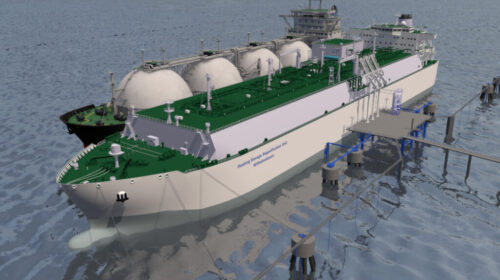This was announced by German Chancellor Olaf Scholz at a special session of the Bundestag on 27 February 2022 addressing Russia’s attack on Ukraine.
As informed, the LNG terminals are planned to be located in Brunsbüttel and Wilhelmshaven.
Currently, there are several liquefied natural gas terminals in Europe, however, none of them are located in Germany.
Security of energy supply
Scholz also confirmed the country will increase the amount of natural gas in storage via long-term options to two billion cubic meters.
Furthermore, Germany will acquire additional natural gas on the world markets – in consultation with the European Union.
With these decisions, the government wants to guarantee a secure energy supply for Germany and eliminate dependence on imports from individual energy suppliers.
Last week, Germany halted the process of certifying the Nord Stream 2 gas pipeline from Russia in response to the crisis in Ukraine. Nord Stream 2 construction was completed in September 2021 but the project requires regulatory certification from Germany before gas delivery could begin.
he events of recent days and weeks have shown us that responsible, forward-looking energy policy is not just crucial for our economy and our climate,” Chancellor Scholz stressed.
“It is also crucial for our security. This means that the faster we make progress with the development of renewable energies, the better.”
According to Scholz, the short-term goals are in line with Germany’s long-term strategy that includes the ongoing transition to a low-carbon economy. The country aims to become carbon neutral by 2045.
“Our current short-term needs can dovetail with what is already needed long-term for the transformation to succeed,” Scholz added.
“An LNG terminal that today receives gas can tomorrow be used to import green hydrogen.”
Scholz also touched upon high energy prices and said the government has agreed on a relief package that includes lifting the surcharge under the Renewable Energy Sources Act by the end of this year.
Related Article
Oil price soars past $100 mark as Russia-Ukraine crisis escalates
CATEGORIES:
BUSINESS & FINANCE
Posted:5 days ago
Energy Minister: “We must make ourselves self-sufficient”
Olaf Lies, Lower Saxony’s Energy Minister has welcomed Scholz’s announcement on the planned construction of LNG terminals that would ensure the necessary infrastructure for the import of LNG.
“We must make ourselves self-sufficient from one-sided dependencies as quickly as possible. There is no longer any doubt that imports from Russia can no longer form the basis of our security of supply,” Lies said.
He pointed out that Germany needs to create new facts in terms of energy policy. To do this, the country is required to make “courageous” decisions in three areas.
Firstly, Germany must expand renewable energies even faster, Lies believes. The expansion of renewables will give the country freedom and independence from energy policy blackmail attempts, according to Lies.
Secondly, Germany needs to ensure that its strategic coal and gas reserves are sufficient, Lies noted.
Thirdly, the necessary infrastructure for importing liquid gas in the short term needs to be created — initially as an interim solution for fossil gas and later to be able to switch to the supply of green, climate-neutral gas.
“Right from the start, we have to think about the currently needed LNG terminals in such a way that they can be used for both. They must be green gas ready. This is not only technically possible but it is also part of the concepts for such a terminal in Wilhelmshaven,” Lies explained.
“We as a state will … do everything we can to advance the planning together with the city of Wilhelmshaven and the federal government. We can manage to start landing liquid gas as early as 2024. To do this, we have to take planning shortcuts wherever and whenever possible,” he concluded.
Gasunie developing LNG terminal in Brunsbüttel
Gasunie, a Dutch operator of energy infrastructure in the Netherlands and Germany, said it will take extra steps in the coming period to safeguard the security of gas supply for the Netherlands, Germany and Europe.
In concrete terms, this involves the construction of a new storage terminal for LNG and sustainable energy in Brunsbüttel.
Gasunie is also investigating the possibility of further increasing its LNG import capacity into the Netherlands before the end of the year. These steps are taken in close cooperation with the German and Dutch governments, the Groningen-based company said.
As informed by Gasunie, one of the two LNG import terminals announced by Scholz is a terminal in Brunsbüttel that Gasunie is developing.
“Talks with the German government about the construction are in the final stage. Gasunie hopes to start construction of the terminal before the end of the year. In addition to LNG, this terminal will be made suitable for importing (green) hydrogen as well,” Gasunie said in a statement.
Gasunie announced it will also freeze all non-operational relations and contacts with Russian companies, such as Gazprom. On the basis of its 9% shareholding, Gasunie’s CEO has a qualitative seat on Nord Stream’s Shareholders Committee. In light of current developments, Han Fennema is suspending his activities in this regard.





